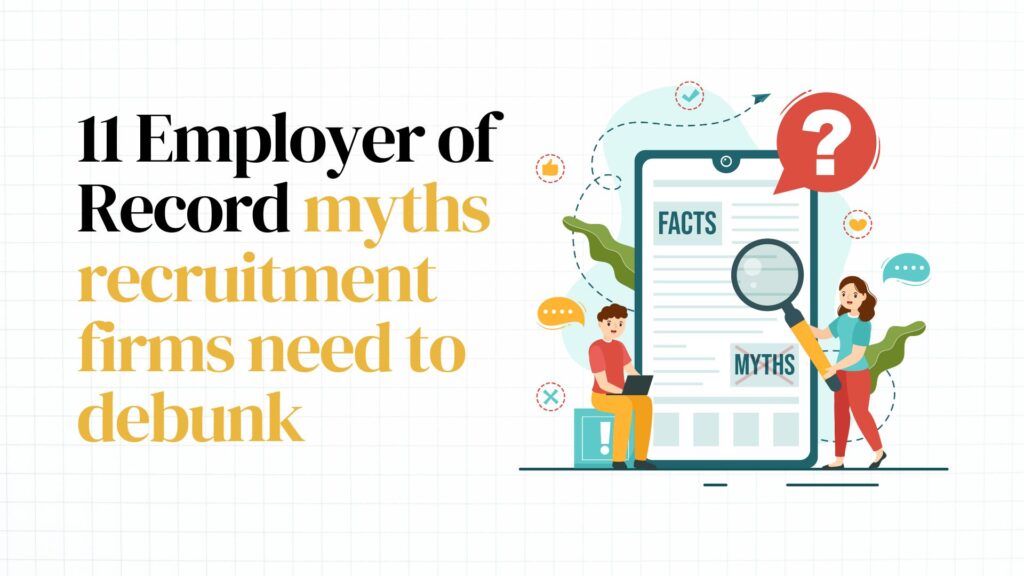Employer of Record (EOR) services can be incredibly valuable for recruitment firms, especially when managing international placements or complex employment scenarios. However, several myths persist about EORs, and understanding these misconceptions is crucial for recruitment firms to effectively utilize EOR services and set proper expectations for their clients.
Myth: An EOR owns or controls your workforce
Reality: An EOR provides the legal and administrative structure for employing workers, but they don’t manage day-to-day operations or performance. The client company retains full control over tasks, projects, and the direct relationship with the worker. The EOR simply handles HR, payroll, tax, and compliance responsibilities.
Myth: EORs are only for large companies
Reality: EORs can be beneficial for businesses of all sizes. Small and medium-sized businesses often use EORs to expand quickly into new markets without needing to establish a local entity. EORs help level the playing field by providing smaller companies with affordable access to compliant hiring abroad.
Myth: EORs are just payroll providers
Reality: While payroll is a significant part of an EOR’s service, they offer much more. EORs ensure compliance with local labor laws, manage employee benefits, handle taxes, and assist with HR administration. They act as the legal employer, reducing the risk of misclassification and compliance issues for client companies.
Myth: EORs reduce employee satisfaction
Reality: Some believe candidates may feel detached or less secure being employed by an EOR rather than directly by the client company. However, reputable EORs offer competitive benefits, smooth onboarding, well-structured employment processes, and clear communication to ensure a positive employee experience.
Myth: EORs limit the client’s control over the employee
Reality: The client retains full control over the employee’s day-to-day work, tasks, and responsibilities. The EOR is responsible solely for administrative tasks, such as issuing compliant contracts, processing payroll, and managing taxes and benefits.
Myth: An EOR removes the need for recruitment firms to understand local laws
Reality: While EORs handle compliance, recruitment firms still benefit from understanding basic labor laws and cultural nuances in the countries they are working in. This knowledge can help them guide clients and candidates effectively and build trust.
Myth: EORs are only for temporary or contract workers
Reality: EORs can hire both permanent/salaried workers and temporary workers, depending on the client’s needs. They provide flexibility for companies looking to establish long-term relationships with employees abroad without the need to open a local entity.
Myth: EORs are too expensive
Reality: While there are costs associated with EOR services, they often save companies money by reducing the risk of fines or penalties for non-compliance with labor laws in foreign or unfamiliar jurisdictions. They eliminate the need for setting up legal entities in new countries, which can be prohibitively expensive and time-consuming. They also reduce the amount of internal resources dedicated to administering and maintaining these workers such as internal HR, payroll/benefits specialists, and compliance teams.
Myth: EORs mean a loss of company culture
Reality: EORs do not interfere with a company’s culture. While the EOR is technically the legal employer, the client company directly manages the employees, integrates them into their team, and instills their own culture, values, and standards.
Myth: EORs are not necessary if you already have contractors
Reality: Many companies believe that hiring contractors is an easy way to bypass the need for an EOR. An EOR can help manage employees correctly and reduce the risk of non-compliance associated with various state, federal, and local and tax labor laws. EORs also allow companies to offer different benefits to their EOR managed workers than they would offer to their directly engaged workers. All workers engaged directly need to be offered the same benefits (health, 401k, etc.) to maintain compliance with various non-discrimination laws.
Myth: EORs Are only for companies expanding internationally
Reality: While EORs are widely used for international hiring, they can also be helpful for domestic companies. For example, companies operating across U.S. states with complex, varied employment laws can use an EOR to ensure compliance and manage multi-jurisdictional payroll and HR needs.
Why this matters for recruitment firms
Recruitment firms partnering with EORs can expand their offerings and place candidates in regions they might otherwise avoid due to legal or logistical complexities.
If you’re ready to partner with an EOR, get in touch with our team.



